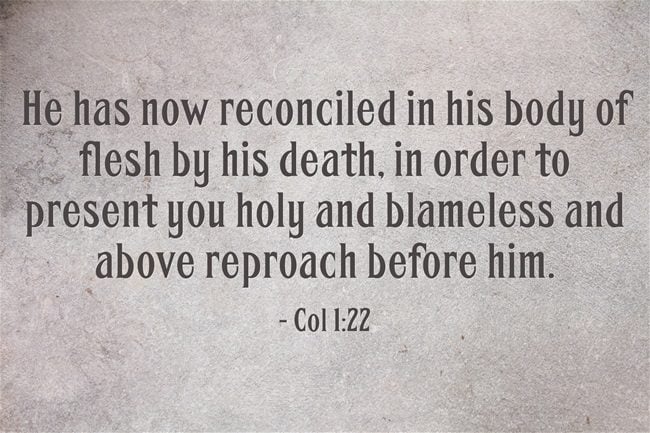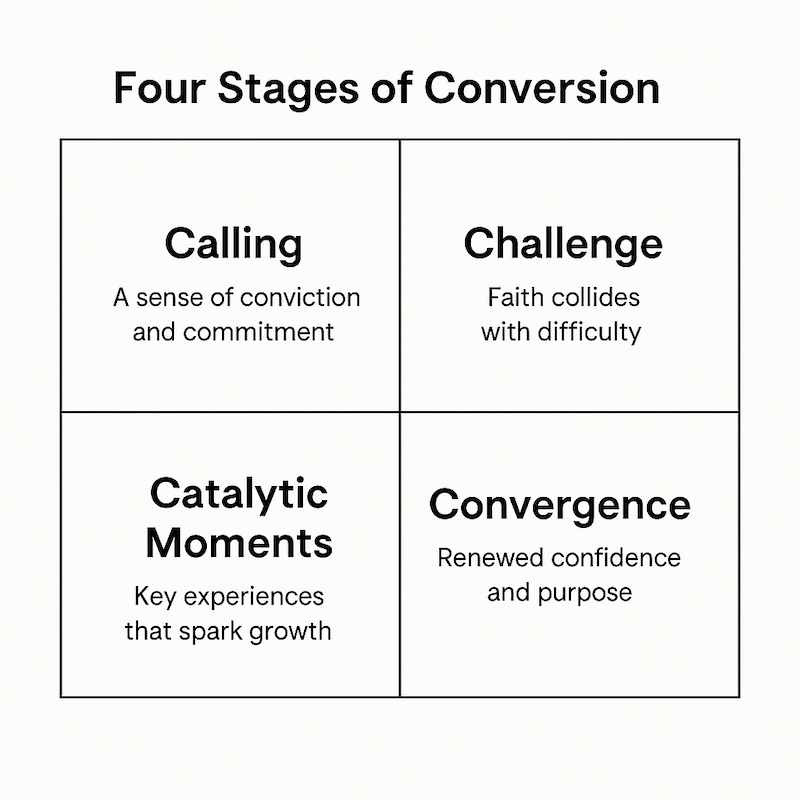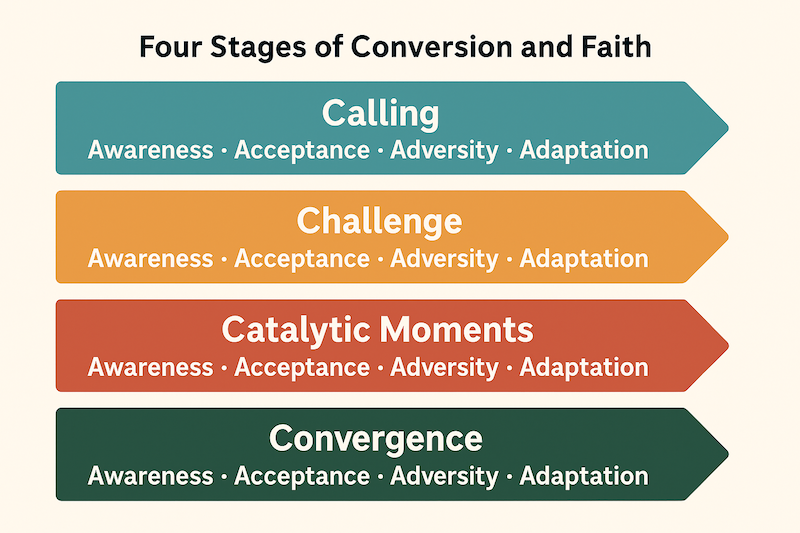Four Stages of Faith and Conversion
Scripture reminds us that faith and conversion are not just moments but a journey. There are at least four stages of faith and conversion, but I will hit on that later. The psalmist writes,
“He guides me along the right paths for his name’s sake” (
Psalm 23:3). Abraham stepped into the unknown (
Genesis 12:1), Israel followed God through cloud and fire (
Exodus 13:21–22), and the disciples on the road to Emmaus felt their hearts burn as they realized Jesus was with them along the route (
Luke 24:32). Paul says,
“We live by faith, not by sight” (
2 Corinthians 5:7), trusting that the God who began a good work in us
“will carry it on to completion until the day of Christ Jesus” (
Philippians 1:6). As followers of Jesus, we are called to fix our eyes on him and walk the journey of faith set before us (
Hebrews 12:1–2).
Four Stages of Conversion and Faith
I’ve been following Jesus for some time now, and one thing I’ve noticed is that Christians, like individuals in almost every religion or philosophy, try to describe a pathway to growth or transformation. Whether we call it conversion, enlightenment, or discipleship, we long to name and map the journey in which what we believe becomes who we are.
Over the years, many models have emerged and helped us to think about how faith develops for the follower of Jesus. For example,
James Fowler’s Stages of Faith, the
Engel Scale,
M. Scott Peck’s framework, and
The Critical Journey by Janet Hagberg and Robert Guelich are just a few. There is also
Brian McLaren’s Four Stages of Faith,
InterVarsity’s 5 Thresholds of Conversion, the
Discipleship Square from Mike Breen, and niche models like J. Robert Clinton’s
leadership emergence theory, which all give us insight into the journey of faith from calling to conversion.
Looking at these alongside Scripture and the stories of Jesus’ closest followers, over the years, I have tried to take notes on developing a memorable and straightforward way of talking about the journey of faith for my work as a pastor, such as at
River Corner Church, and to describe to those whom I walk alongside at
Water Street Mission. The disciples’ time with Jesus shows us four clear signposts that I call the four stages of conversion and faith: calling, challenge, catalytic moments, and convergence.
I admit that I oversimplified the stages to avoid formulas and to make it memorable in the contexts I serve. It’s a framework for reference, not a metric.
A Note on Conversion
When many of us hear the word “conversion,” we tend, for some reason, to think of a single dramatic moment. I believe that scripture reminds us that conversion is both a moment and a process. Some verses, like Romans 10:9, tend to point to a decisive confession of faith: “If you declare with your mouth, ‘Jesus is Lord,’ and believe in your heart that God raised him from the dead, you will be saved.” Other verses point to a process, such as
Romans 12:2, which tells us we are also “transformed by the renewing of our minds.” Different names have been given to these moments and processes, such as “salvation,” “justification,” and “progressive sanctification.”
As a pastoral leader, what I have noticed is that for some, the shift is certainly sudden—there is an otherworldly moment in which addiction flees, transformation happens, and Spiritual Authority is extended—but for many others, it’s a gradual process. I remember something asking me, “What was Peter’s point of conversion?” Over the years, I have asked others that same question, and it has led to friendly debates between the camps that have a canned answer for this. I believe, though, that even the disciples couldn’t always point to one moment of belief during their journey with Jesus.
They understood in hindsight more than in the moment, though they experienced conversion and Spiritual authority moments intertwined with their ongoing struggles with doubts and selfishness. To use Peter again, we have to admit that Peter himself wrestled through many layers of awareness, failure, and growth before his faith converged after the resurrection. Perhaps it was at the ascension, as they watched Jesus disappear into the clouds, that Peter finally got who his otherworldly Rabbi was. In truth, for most of us (like with the disciples), the journey of conversion is progressive, a lifelong unfolding as we learn more and more to say yes to Jesus, surrender to God the Father, and allow the Holy Spirit to transform our hearts and minds.
The Four Stages of Faith
In the past few years, I have begun to formulate my notes on the Christian experience. Influenced by the many other models named above, and others, I have summarized the Christian journey in four stages for myself and the contexts that I serve.
- Calling: Like the disciples who first heard Jesus’ invitation, we experience a sense of calling. We feel conviction, respond to God’s voice, and begin to orient our lives toward God’s Kingdom. This stage focuses on building a relationship with God and learning the foundations of faith.
- Challenge: Sooner or later, our faith collides with difficulty. Doubt, disillusionment, and hardship unsettle what once felt certain. Some walk away here, while others try to hold on to earlier simplicity. But for those who continue, this stage deepens resilience and widens our capacity to trust God.
- Catalytic Moments: God often uses key experiences, relationships, or insights to spark growth. These moments are stretching and sometimes disruptive, but they bring clarity and fresh commitment. This stage is about integrating faith more deeply into daily life, not just holding on to belief but living it in practical ways.
- Convergence: In time, the journey through calling, challenge, and catalysts begins to come together with meaning and renewed purpose. We recognize how God has been shaping us all along. Convergence brings confidence, character, and a sense of purpose. Here, our faith naturally flows outward into service and mission. Like Peter in Acts, we discover that even our presence can influence others for the kingdom of God.
We don’t move through these stages in a straight line. Often, we find ourselves circling back, revisiting earlier stages before moving forward again. Some seasons we linger longer in one stage than another, and each return deepens our understanding. Calling, challenge, and catalytic moments often repeat in cycles, each time stretching us, shaping our character, and expanding the capacity Jesus gives us. Over time, these repetitions prepare us to step with greater confidence into the stage of convergence. Every story is unique, and how each person engages these stages will always be shaped by their context and journey. For me, just being aware of these familiar signposts—calling, challenge, catalytic moments, and convergence—we begin to see more clearly the ways God faithfully forms us.
Diagram 1: Four Stages of Faith and Conversion
Cycles Within Each Stage
Each stage carries its own rhythm. Within all four stages of faith lies a fourfold path:
awareness,
acceptance,
adversity, and
adaptation.
Awareness comes first, as God’s leading is revealed.
Acceptance follows, embracing what accepting “it” means for life.
Adversity then arrives, testing conviction and exposing weakness in our newly learned skills, and God whispers. Finally,
adaptation emerges as life shifts into obediently living out the new way God is shaping in our journey, and the current stage.
Peter’s calling shows this rhythm in action.
Awareness began when Jesus said, “Follow me,” and Peter realized God was inviting him into something new.
Acceptance came as Peter left his nets and started to walk in the way of a disciple.
Adversity soon appeared when expectations clashed with Jesus’ words and actions, his confusion on messanic expectations, leaving Peter uncertain of what following would mean as Jesus drove him behind him into surrender.
Adaptation followed as Peter continued forward, slowly reshaping his understanding of Jesus and what the calling required.
Peter then made the same journey through the following two stages (Challenge and Catalytic Moments) until he finally realized who God called him to be as he stood up in Acts and delivered a compelling sermon at Pentecost.
Diagram 2: Four Stages of Faith and Conversion
The Role of Mentors and Community
No one makes this journey alone. Jesus led his disciples step by step, moving from the stage of “I do, you watch” to “let’s do together,” and then “you do, I help,” until Jesus finally said, “I call you friends” (John 15:15). The first thing Jesus told Paul, after his divine enounter, was to find community and a mentor. The effectiveness of the early church was defined by a community that was invested together.
Mentors and spiritual friends are vital for the journey. They encourage us, challenge us, and walk alongside us as we grow. Communities of faith matter too, because each person carries different strengths. One may offer wisdom in finances, another in prayer, another in relationships. Together, the body of Christ helps us grow in a way no one mentor could on their own. In another post, I will explore how we need different types of leaders in each stage.
Closing Thought
The four stages of conversion and faith are not a formula or a timeline. Everyone traverses back and forth through these stages. Some of these stages we camp out longer than others. There are many layers to an onion; each layer peels back, revealing another one. The journey through the first three stages is similar. We come around a few times through calling, challenge, and catalytic moments until we are converted a little more, until we have a deeper understanding of character and what capacity Jesus gave us.
As we understand that, we can hopefully traverse boldly into the convergence stage. Every story is unique. How each person engages each stage and what they learn in it is also contextualized to their story. However, by paying attention to these familiar signposts—calling, challenge, catalytic moments, and convergence—we can better see how God shapes us over time.
You may have noticed that I’ve used concepts that would represent theological ideas like conversion, justification, and sanctification somewhat interchangeably. The truth is, I am not a Calvinist. I see life as an ongoing invitation to say yes to Jesus. For some, that journey may sadly lead to walking away for eternity. Some stages might be too much for some, and they just quit. At the same time, I believe that there is a surprising salvific grace where many will be drawn into the vast, loving net of Christ. No matter how hard the journey, nothing can remove us from the hand of God.
As we continue to progress through the stages, we will grow in our security with Jesus and in the person God is creating us to be. To me, conversion is not a single event but a journey. Sanctification is also a journey. Both are intertwined with discipleship, as we learn—slowly and imperfectly—what it means to live and love like Jesus.
I admit that I oversimplified the stages to avoid formulas and to make it memorable in the contexts I serve. It’s a framework for reference, not a metric. You can debate them in the comments.
Wherever you are on the journey, may you find hope that God is at work in you, leading you ever closer to Jesus.
- Which stage—calling, challenge, catalytic moments, or convergence—do you most identify with right now in your faith journey?
- How have mentors, friends, or the community supported you as you’ve grown in faith?
- Where might God be inviting you to adapt, trust, or take a new step forward in this season?



